Politics
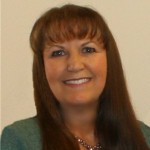 In this day of the internet, cell phones, television, and radio, a new form of patriotism has emerged. The rights our American soldiers fought for are in peril. In a year in which many Americans were offended by literally everything, and the internet, specifically Facebook, has become one of the greatest sounding boards there is, everyone has stepped up to the plate to state their views and yes, even to hear the views of others. Of course, hearing the views of other people, is not always something that is well received. Sometimes, people lose sight of the fact that since we each own our own Facebook page, we also have the right to say what we want to say. Others may not agree, but that doesn’t matter, because this is our page…our right to free speech.
In this day of the internet, cell phones, television, and radio, a new form of patriotism has emerged. The rights our American soldiers fought for are in peril. In a year in which many Americans were offended by literally everything, and the internet, specifically Facebook, has become one of the greatest sounding boards there is, everyone has stepped up to the plate to state their views and yes, even to hear the views of others. Of course, hearing the views of other people, is not always something that is well received. Sometimes, people lose sight of the fact that since we each own our own Facebook page, we also have the right to say what we want to say. Others may not agree, but that doesn’t matter, because this is our page…our right to free speech.
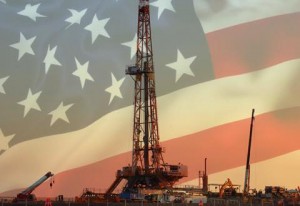
Of course, people with differing views have the right to challenge our views…to state their own case, as it were, but they don’t have the right to challenge our right to speak our own opinion on our own page. If we are offended by the views of another person, we need to move past the post. Never is this more evident than when the opinions of one person in a family offends another, and they decided to take things to the next level…unfriending. I won’t do that, because while I will state my opinion, and I will respect the rights of my friends to post what they choose, and to debate my opinion, the family connection is far too important to me to argue in 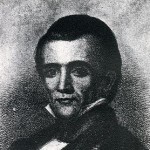 such a way.
such a way.
In history, patriots had to go to the place they were going to protest. And of course, by the time they could get there, it was probably too late to protest. I suppose maybe our politicians were more honest back then, or maybe we just didn’t know all that was going on. It has been said that some presidents would never have been elected if we could have seen them. That is so true, and sometimes I think maybe that should be how it is today. If race, gender, and maybe even party affiliation weren’t able to be seen, who would we elect? That might be something to think about. Maybe we need to stop giving a pass because of race or gender, and make the politicians do what’s right.
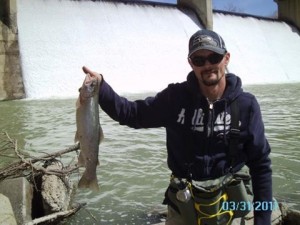 My nephew, Chris Iverson is a dedicated dad. When his son, with his wife Cassie, was born with Downs Syndrome he stepped right up to the plate. Lucas was his boy, and that was the greatest thing ever. Chris and Cassie have also taken up the cause to bring awareness to the world about just how amazing these children are. Lucas is such a happy boy, and while he can have his moods like any other kid, he smiles a lot. I think that is partly due to the amazing parents he has. Of course, becoming a big brother this past summer was great for Lucas and his parents too. Chris and Cassie’s little girl, Zoey arrived right on schedule and she thinks her big brother is pretty great. She thinks her parents are great too.
My nephew, Chris Iverson is a dedicated dad. When his son, with his wife Cassie, was born with Downs Syndrome he stepped right up to the plate. Lucas was his boy, and that was the greatest thing ever. Chris and Cassie have also taken up the cause to bring awareness to the world about just how amazing these children are. Lucas is such a happy boy, and while he can have his moods like any other kid, he smiles a lot. I think that is partly due to the amazing parents he has. Of course, becoming a big brother this past summer was great for Lucas and his parents too. Chris and Cassie’s little girl, Zoey arrived right on schedule and she thinks her big brother is pretty great. She thinks her parents are great too.
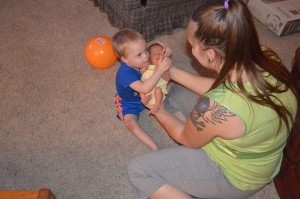
Chris loves the outdoors, and wants to teach his kids to love it too. He and Cassie like to go camping in the Big Horn Mountains. Chris loves to fish and just enjoy the great outdoors. I’m sure that as time goes on, he will be teaching his kids the ropes, thereby setting the stage for the next generation of nature lovers. I can’t blame Chris for loving the great outdoors, because I feel the same way. My big thing is hiking, and I don’t really know if Chris shares that with me or not, but to each his own. I’m not into camping. I guess that after spending the day hiking in the woods, I want the comforts of a motel. Nevertheless, I have a lot of respect for people who get out and rough it.
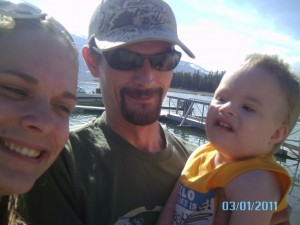
One of the things I like the most about Chris is that he is a patriot. These days, we need every patriot we can get. With the government trying to take our rights away from us every day, America needs people who will stand up for those rights, whether it is fighting or being very vocal about what is going on. Either one takes real guts, and Chris has guts. We really need more people like that in our country these days. I like that Chris stands up for our country. He is a good man, dedicated dad, good husband, and a patriot…what more could a family ask of a man. Today is Chris’ birthday. Happy birthday Chris!! Have a great day!! We love you!!
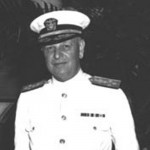 It seems that whenever something goes wrong in our world, someone must be to blame, and I believe that is often the case. The problem with playing The Blame Game, is that all too often, the person where the real blame should go is not the one who ends up taking the fall. Scapegoats have been around since Bible times, when the sins of the people were placed on a goat and it was sent into the windernesss. That isn’t the type of scapegoat that we see today, however.
It seems that whenever something goes wrong in our world, someone must be to blame, and I believe that is often the case. The problem with playing The Blame Game, is that all too often, the person where the real blame should go is not the one who ends up taking the fall. Scapegoats have been around since Bible times, when the sins of the people were placed on a goat and it was sent into the windernesss. That isn’t the type of scapegoat that we see today, however.
Don’t get me wrong, we all play The Blame Game, but politicians seem to be particularly adept at it. A good example is the forced retirement of Rear Admiral Husband E Kimmel, who was relieved of his command of the United States Pacific Fleet on December 17, 1941, just ten days after the Japanese attack on Pearl Harbor. I don’t say that he bore no blame at all, but in reality, he had no more reason to think that an attack on Pearl Harbor was imminent, than anyone else had. And in reality, the blame needed to fall on our President at the time, Franklin Delano Roosevelt, because he was soft on the Japanese, and basically asked us to trust them, when they were not at all 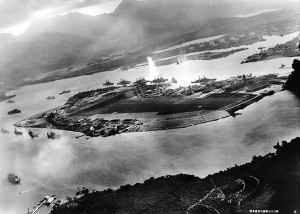 trustworthy. President Roosevelt’s actions…or lack thereof, left us sitting ducks when the Japanese made their move.
trustworthy. President Roosevelt’s actions…or lack thereof, left us sitting ducks when the Japanese made their move.
Basically, Rear Admiral Kimmel was chosen to take the blame because of his lack of imagination…or so it was said. Kimmel was a creature of habit, and he had expected an attack on Midway Island or Wake Island, and even went so far as to request extra antiaircraft artillery be sent there. None could be spared, and so was not sent. It never occurred to him that the Japanese might attack Pearl Harbor, and therefore he took no special action there. Unfortunately, Kimmel was an easy read by the Japanese, and when he chose not to protect Pearl Harbor, that was where the Japanese made their attack. But, as I said, he had no more reason to expect an attack at Pearl Harbor than anyone else had, and for that reason he should not have born the brunt of the blame.
Kimmel could have faced court martial…a second and even more severe injustice…but in the end, when he requested early retirement, his request was granted. The American people were outraged at this breach in 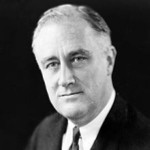 security, so someone had to take the blame. I really find that to be an unfair way to handle this situation, but it was how it was done anyway. When Admiral Kimmel’s Story, which was an “as told to” autobiography, was published in 1955, the admiral made it clear that he believed President Roosevelt sacrificed him, and his career, to take suspicion off himself. Although there was no evidence to prove it, Kimmel believed Roosevelt knew Pearl Harbor was going to be bombed. I’m not sure Roosevelt could have known that either, but I think he was just as much or more to blame than Kimmel was. There always seems to be enough blame to go around, but in reality, trusting our enemies will always bring bad results. We need to be watchful and strong in military might to keep this nation safe.
security, so someone had to take the blame. I really find that to be an unfair way to handle this situation, but it was how it was done anyway. When Admiral Kimmel’s Story, which was an “as told to” autobiography, was published in 1955, the admiral made it clear that he believed President Roosevelt sacrificed him, and his career, to take suspicion off himself. Although there was no evidence to prove it, Kimmel believed Roosevelt knew Pearl Harbor was going to be bombed. I’m not sure Roosevelt could have known that either, but I think he was just as much or more to blame than Kimmel was. There always seems to be enough blame to go around, but in reality, trusting our enemies will always bring bad results. We need to be watchful and strong in military might to keep this nation safe.
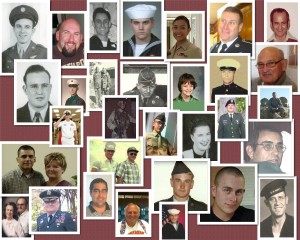 There once was a time when things like duty, sacrifice, and honor meant something. People were thankful for the service of our armed forces, who were willing to give all to ensure the freedoms we have in this nation. Sadly, these days, so many people think that our freedoms are somehow an infringement on the rights of others. They feel like freedom should be controlled by a select few…namely our government. I can’t figure out why they can’t understand that when the government controls your freedoms, you are no longer free. That’s living in a dictatorship, and not in freedom.
There once was a time when things like duty, sacrifice, and honor meant something. People were thankful for the service of our armed forces, who were willing to give all to ensure the freedoms we have in this nation. Sadly, these days, so many people think that our freedoms are somehow an infringement on the rights of others. They feel like freedom should be controlled by a select few…namely our government. I can’t figure out why they can’t understand that when the government controls your freedoms, you are no longer free. That’s living in a dictatorship, and not in freedom.
For as long as the United States has been able to form it’s own military force, we have been a people who fought for the rights of all people to think, speak, and believe as they choose…whether anyone else agrees with them or not. It was our soldiers who fought to give us those rights, and oddly enough, when people did not have the right to decide how others should think, there was far less hate and racism in this country. I realize that when people are allowed to worship, think, speak, and write as they choose, there will be disagreement with their opinions, and that’s ok. Disagree with me all you like, just don’t try to tell me that I have to think the way you think, and I will show you the same courtesy.
Our military personnel go to war whenever asked, whether it is a holiday or not. They can’t stop defending us and other nations just because it’s Thanksgiving or Christmas. They get up and they fight on. They don’t have the luxury of a 9 to 5 job, but rather must be prepared to battle well into the night and even into the next day, because the enemy doesn’t take a break. There has never really been a time in our history when things were in more turmoil. There are those, even within our own borders who hate this nation and all it stands for. Those people have no honor, no sense of duty or pride in our nation, and they certainly don’t understand the sacrifices our military personnel made to give them the freedom to be so hateful toward those who are just stating their opinion.
Today is Veteran’s Day. It is a day set aside to honor those who have fought for this nation and others. It is a day to remember those who gave their lives that others might live in freedom. In reality, we owe them so much more than we could ever repay, but most of all, we owe them respect. Veteran’s Day is a day to tell our veterans just how much they mean to us. Be sure to thank a veteran today, and to all Veterans, Happy Veterans Day. Thank you for your service. Your sacrifice will never be forgotten.
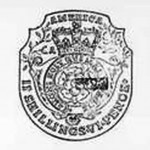 During the years that the colonies were still a part of Great Britain, it was necessary to have troops from Great Britain come and help to defend us during the French and Indian War which took place between 1754 to 1763, and Pontiac’s Rebellion from 1763 to 1764. These were quite costly wars, and to help with recuperate the losses, Great Britain enacted the Sugar Act, which while irritating to the people of the colonies, but it was hidden in the cost of import duties, and so the people accepted it. The enactment of The Stamp Act was a different story, however. The Stamp Act was a tax that Great Britain levied on just the colonies and was strongly disputed. So strongly in fact, that it led to the Revolutionary War.
During the years that the colonies were still a part of Great Britain, it was necessary to have troops from Great Britain come and help to defend us during the French and Indian War which took place between 1754 to 1763, and Pontiac’s Rebellion from 1763 to 1764. These were quite costly wars, and to help with recuperate the losses, Great Britain enacted the Sugar Act, which while irritating to the people of the colonies, but it was hidden in the cost of import duties, and so the people accepted it. The enactment of The Stamp Act was a different story, however. The Stamp Act was a tax that Great Britain levied on just the colonies and was strongly disputed. So strongly in fact, that it led to the Revolutionary War.
The Stamp Act was not what people might think it was. It was not when the use of postage stamps were first introduced. The Stamp Act went so much further than that. The Stamp Act was designed to force colonists to use special stamped paper in the printing of newspapers, pamphlets, almanacs, and playing cards, and to have a stamp embossed on all commercial and legal papers. The stamp itself displayed an image of a Tudor rose framed by the word “America” and the French phrase Honi soit qui mal y pense, meaning ”Shame to him who thinks evil of it.” Of course, the cost of said paper was high, and the colonists ere outraged. This was taxation, without representation, and it was not going to be tolerated.
Massachusetts politician Samuel Adams organized the secret Sons of Liberty organization. They planned protests against the measure, and the Virginia legislature and other colonial assemblies passed resolutions opposing the act. In October, nine colonies sent representatives to New York to attend a Stamp Act Congress, where resolutions of “rights and grievances” were framed and sent to Parliament and King George III. Their voices landed on deaf ears, and The Stamp Act was enacted on this day, November 1, 1765.
The colonists acted quickly. The arrival of the stamps to stamp the paper brought violence and economic retaliation. The colonists began a general boycott of British goods. The Sons of Liberty staged attacks on the customhouses and homes of tax collectors in Boston. The protests and economic turmoil went on for months. Finally, Benjamin Franklin appealed to the British House of Commons. Parliament took a vote, and they repealed The Stamp Act in March 1766. The same day, they made the mistake of passing Declaratory Acts, stating that the British government had free and total legislative power over the colonies.
This would prove to be their downfall. Parliament attempted to force unpopular taxation measures on the American colonies in the late 1760s. This action lead to a steady, and eventually complete, deterioration in British-American relations that brought about the outbreak of the American Revolution in 1775, and the eventual Declaration of Independence of America from Great Britain. It was a hard lesson for Great Britain to 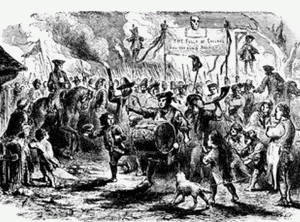 learn, and on that some political parties, namely the Democrats have not learned yet. When you tax the people too heavily, they will rebel, and the outcome will not be in the favor of that abusive government. If taxes are lower, the country will grow. Entrepreneurs will begin new ventures, and the country will prosper, and with prosperity, comes the natural process of more money to run the government. Ours is a nation of independent thinkers, and people of action. Taxes that are too high and unfair, stifle that independent thinking and slow down that action. It is just the opposite of what the proponents of a grossly obese government would expect, but it is nevertheless, the way it works. Our government would do well to realize that, and make a change.
learn, and on that some political parties, namely the Democrats have not learned yet. When you tax the people too heavily, they will rebel, and the outcome will not be in the favor of that abusive government. If taxes are lower, the country will grow. Entrepreneurs will begin new ventures, and the country will prosper, and with prosperity, comes the natural process of more money to run the government. Ours is a nation of independent thinkers, and people of action. Taxes that are too high and unfair, stifle that independent thinking and slow down that action. It is just the opposite of what the proponents of a grossly obese government would expect, but it is nevertheless, the way it works. Our government would do well to realize that, and make a change.
 In a time when our police officers are being randomly attacked, I think it is important to remember just who it is that comes running in to protect those in need of assistance. Police officers have such a complicated job. Part of the people they come in contact with are in need of their assistance, and when they are, they are grateful for the help. The other part of the people are the criminal side, and they are the ones, of course, who hate the cops. And unfortunately, sometimes the lines get very blurred. There are people in need of help, but they don’t want that help, and those who the cops are arresting or giving a ticket to, who then steps in the assist the very police officer who was arresting them. Those situations are really quite surprising…amazingly so.
In a time when our police officers are being randomly attacked, I think it is important to remember just who it is that comes running in to protect those in need of assistance. Police officers have such a complicated job. Part of the people they come in contact with are in need of their assistance, and when they are, they are grateful for the help. The other part of the people are the criminal side, and they are the ones, of course, who hate the cops. And unfortunately, sometimes the lines get very blurred. There are people in need of help, but they don’t want that help, and those who the cops are arresting or giving a ticket to, who then steps in the assist the very police officer who was arresting them. Those situations are really quite surprising…amazingly so.
Nevertheless, I can see how being a police officer would be a difficult occupation. When the good guys can turn into the bad guys, and the bad guys can turn into the good guys, it creates a situation whereby an officer just doesn’t know what to expect going into any situation. Still, they go into those situations, knowing the possible perils, but knowing too that the work they do is important.
Many people don’t really give much thought to the life of a police officer, but when you have two of them in your very close family, you just naturally feel differently about them. You know their hearts and you know their level of integrity. They aren’t just a random police officer, but rather, they are family, and you love them. That is the situation in my family. We have two police officers in our midst. Leutenant Chris Hadlock, of the Casper Police Department, and State Trooper Jason Sawdon of the Wyoming Highway 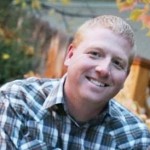 Patrol, are both exceptional officers. I’m sure that is why my family and I take personal offense when someone decides that police officers are not important. There are many times when any of us could be in a really bad place, were it not for a police officer. So the next time you are stopped for speeding, and you are tempted to be angry about it, remember…you were speeding, and they officer is just doing his or her job. Any time we break the law, we are a risk for others…people, just like us, who that officer has sworn an oath to protect. Swallow that anger, and take your medicine. You deserve it. Today is a day to honor our police officers. Thank you Chris and Jason, and the officers in the Casper area and the nation. We appreciate your service. Police lives matter. Thank a police officer today.
Patrol, are both exceptional officers. I’m sure that is why my family and I take personal offense when someone decides that police officers are not important. There are many times when any of us could be in a really bad place, were it not for a police officer. So the next time you are stopped for speeding, and you are tempted to be angry about it, remember…you were speeding, and they officer is just doing his or her job. Any time we break the law, we are a risk for others…people, just like us, who that officer has sworn an oath to protect. Swallow that anger, and take your medicine. You deserve it. Today is a day to honor our police officers. Thank you Chris and Jason, and the officers in the Casper area and the nation. We appreciate your service. Police lives matter. Thank a police officer today.
 The Constitution has been in the news a lot these days, or shall I say, the violation of the Constitution. Sometimes I wonder if the signers of the Constitution would even be able to recognize the nation that they had envisioned when they wrote the Constitution. I happen to think they would not, but then even at the signing of the Constitution there was controversy. In that way, I suppose there would always be those who would do everything in their power to change or even do away with the Constitution. At the time of the Constitutional Convention in Philadelphia, only 38 of the 41 delegates present at its conclusion, agreed to sign the document. There were those, even then, who disagreed with what was laid out there. I suppose that is common in anything in life. Needless to say, it was a hard-won battle to win the ratification by the necessary nine out of thirteen US states in existence at the time.
The Constitution has been in the news a lot these days, or shall I say, the violation of the Constitution. Sometimes I wonder if the signers of the Constitution would even be able to recognize the nation that they had envisioned when they wrote the Constitution. I happen to think they would not, but then even at the signing of the Constitution there was controversy. In that way, I suppose there would always be those who would do everything in their power to change or even do away with the Constitution. At the time of the Constitutional Convention in Philadelphia, only 38 of the 41 delegates present at its conclusion, agreed to sign the document. There were those, even then, who disagreed with what was laid out there. I suppose that is common in anything in life. Needless to say, it was a hard-won battle to win the ratification by the necessary nine out of thirteen US states in existence at the time.
Before the Constitution, the United States was operating under the Articles of Confederation, which was ratified several months before the British surrender at Yorktown in 1781. The Articles of Confederation and Perpetual Union were an agreement among all thirteen original states in the United States of America. Basically it was the first constitution. Even when not yet ratified, the Articles provided a system for the Continental Congress to direct the American Revolutionary War, conduct diplomacy with Europe, and deal with territorial issues and Native American relations, but it was weak in that it didn’t allow for our president, a court system, or taxation, thereby leaving us with a weaker government. Congress was also given no authority to enforce its requests to the states for troops, giving us a weaker military force. Yet, even with the proposed changes, there were those who would disagreed with the proposed new Constitution.
When the Constitutional Convention was convened on May 25, 1787, the plan had been to amend the Articles 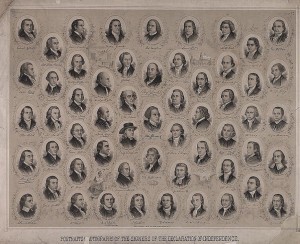 of Confederation, but that plan was quickly set aside in favor of writing a completely new Constitution. The meeting was held in Philadelphia’s Pennsylvania State House. It is now known as Independence Hall. Revolutionary War hero George Washington, a delegate from Virginia was elected as convention president. The debate was heated, but in the end, the delegates came up with a brilliant federal organization that boasted an intricate system of checks and balances. One of the main divisions in the discussions was that the more populated states wanted a state representation in Congress, and the smaller states wanted equal representation. That problem was solved by the Connecticut Compromise, which proposed a two chamber legislature with proportional representation in the lower house known as the House of Representatives and equal representation of the states in the upper house known as the Senate. It seemed a fair way to do it, but there are still those who disagree to this day.
of Confederation, but that plan was quickly set aside in favor of writing a completely new Constitution. The meeting was held in Philadelphia’s Pennsylvania State House. It is now known as Independence Hall. Revolutionary War hero George Washington, a delegate from Virginia was elected as convention president. The debate was heated, but in the end, the delegates came up with a brilliant federal organization that boasted an intricate system of checks and balances. One of the main divisions in the discussions was that the more populated states wanted a state representation in Congress, and the smaller states wanted equal representation. That problem was solved by the Connecticut Compromise, which proposed a two chamber legislature with proportional representation in the lower house known as the House of Representatives and equal representation of the states in the upper house known as the Senate. It seemed a fair way to do it, but there are still those who disagree to this day.
It would seem like they had an instant solution, but that wasn’t so. As dictated by Article VII, the document would not become binding until it was ratified by nine of the 13 states. On December 7, Delaware, Pennsylvania, New Jersey, Georgia, and Connecticut ratified the Constitution in quick succession. Other states, especially Massachusetts, opposed the Constitution, because it failed to reserve undelegated powers to the states and lacked constitutional protection of basic political rights, such as freedom of speech, religion, and the press, which I personally agree with. By February 1788, they had reached a compromise under which Massachusetts and other states would agree to ratify the document and that amendments would immediately be added to provide the protections they proposed. The Constitution was then narrowly ratified in Massachusetts. Maryland and South Carolina quickly followed. On June 21, 1788, New Hampshire became the ninth state to ratify the document, and it was agreed that government under the US Constitution would begin on March 4, 1789. In June, Virginia ratified the Constitution, followed by New York in July. The Constitution was signed on this day, September 17, 1787.
As promised, on September 25, 1789, the first Congress of the United States adopted 12 amendments to the 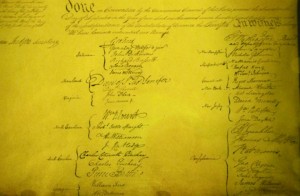 US Constitution, called the Bill of Rights. The Bill of Rights was then sent to the states for ratification. Ten of these amendments were ratified in 1791. In November 1789, North Carolina became the 12th state to ratify the US Constitution. Rhode Island, which opposed federal control of currency and was critical of compromise on the issue of slavery, resisted ratifying the Constitution until the US government threatened to sever commercial relations with the state. On May 29, 1790, Rhode Island voted by two votes to ratify the document, and the last of the original 13 colonies joined the United States. Today, the US Constitution is the oldest written constitution in operation in the world. That should say something, and it should be reason to protect it.
US Constitution, called the Bill of Rights. The Bill of Rights was then sent to the states for ratification. Ten of these amendments were ratified in 1791. In November 1789, North Carolina became the 12th state to ratify the US Constitution. Rhode Island, which opposed federal control of currency and was critical of compromise on the issue of slavery, resisted ratifying the Constitution until the US government threatened to sever commercial relations with the state. On May 29, 1790, Rhode Island voted by two votes to ratify the document, and the last of the original 13 colonies joined the United States. Today, the US Constitution is the oldest written constitution in operation in the world. That should say something, and it should be reason to protect it.
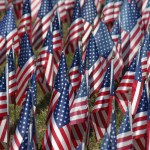 Americans are a people who have no problem speaking their minds. I suppose it all goes back to the reasons we left England in the first place. We were only allowed to believe certain things, and if we chose to be different, we could have been killed or imprisoned. It is what our nation was built on in more ways than just religion. The point was supposed to be that we were free to live our lives as we chose to, within a very few certain guidelines. For the most part, things went along smoothly…until November of 1860, when President Lincoln was elected to the presidency, that is. The people of the Deep South felt that their way of life was being threatened, in that they held slaves, and Lincoln was against slavery, as were the Northern states, or most of the people in the Northern states anyway. Of course, this whole issue brought our nation to war, a really sad thing when two sides of a nation war against each other.
Americans are a people who have no problem speaking their minds. I suppose it all goes back to the reasons we left England in the first place. We were only allowed to believe certain things, and if we chose to be different, we could have been killed or imprisoned. It is what our nation was built on in more ways than just religion. The point was supposed to be that we were free to live our lives as we chose to, within a very few certain guidelines. For the most part, things went along smoothly…until November of 1860, when President Lincoln was elected to the presidency, that is. The people of the Deep South felt that their way of life was being threatened, in that they held slaves, and Lincoln was against slavery, as were the Northern states, or most of the people in the Northern states anyway. Of course, this whole issue brought our nation to war, a really sad thing when two sides of a nation war against each other.
It is a difficult thing when so many people have such differing beliefs about the same issue. And sometimes it gets so ugly, that I have to wonder about the sanity of some people. When people burn or otherwise deface our flag, sometimes in horribly disgusting ways, or do the same to Bibles and other religious books, it is disrespectful. What I find especially disturbing is that these same people want respect for their cause or lifestyle, but they will not give the same respect for the cause or lifestyle of others. It really is a two way street. I know that a lot of people are calling for the removal of the Confederate Flag from…everywhere, but in reality it is a part of our history. We need to remember that because they lost the battle, it 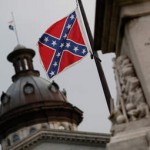 does not mean they were not brave in the fight. Lately, I have seen some shocking displays in this nation. Digging up the graves of a general and his wife, because he fought for the South, and taking shows off the air because they have a reference to a Confederate Flag in them. Political Correctness has tipped the balance of this nation to the point of insanity. It must stop, or we will have another war here. We have already had a threat of states wanting to secede from the union. It is a sad state for this great nation to be in.
does not mean they were not brave in the fight. Lately, I have seen some shocking displays in this nation. Digging up the graves of a general and his wife, because he fought for the South, and taking shows off the air because they have a reference to a Confederate Flag in them. Political Correctness has tipped the balance of this nation to the point of insanity. It must stop, or we will have another war here. We have already had a threat of states wanting to secede from the union. It is a sad state for this great nation to be in.
In the end of the Civil War, the South lost the war, the slaves were freed, and given their proper rights. No, it wasn’t the last of the battles over this issue, unfortunately, but the healing of this nation began. The eleven states that had seceded from the Union…Alabama, Florida, Georgia, Louisiana, Mississippi, South Carolina, Texas, Arkansas, North Carolina, Tennessee and Virginia, were returning one by one. Change was coming and it would slowly come to be accepted. I suppose that, as in the Civil War, the people who are fighting for their rights these days, consider the battles well worth the outcome, and maybe they are, but in many ways, we have forgotten that the people of the other side of the issue have rights too. The country was largely founded on a live and let live way of life…whether you agree with them or not. This may not be the perfect way for our nation to be, but it is as close as we can get. As with the eleven states who returned to the Union, I think it is important to consider the feeling of those who have lost the battle you felt the need to win, because in most cases, they are good people too. On this historic day, as our nation became united again, Georgia became the 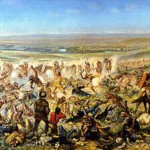 last state to be readmitted to the Union. They returned, because whether they agreed with every thing this nation stood for or not, they still knew that this was a great nation, and one they wanted to be a part of. I believe that was the case of the Cowboys and Indians. We all know that the Indians lost to the cowboys, but that does not make them any less a proud people, nor does it make them any less brave. They deserve respect, as do all the people who have lost the battles that have gone on in this nation about political correctness, policy change, or the battle of the North and South. In the words of Abraham Lincoln, “A house divided against itself cannot stand.” Whether we agree with things or disagree, we must stand united…lest we forget that the rights we take from another today, could be taken from us tomorrow.
last state to be readmitted to the Union. They returned, because whether they agreed with every thing this nation stood for or not, they still knew that this was a great nation, and one they wanted to be a part of. I believe that was the case of the Cowboys and Indians. We all know that the Indians lost to the cowboys, but that does not make them any less a proud people, nor does it make them any less brave. They deserve respect, as do all the people who have lost the battles that have gone on in this nation about political correctness, policy change, or the battle of the North and South. In the words of Abraham Lincoln, “A house divided against itself cannot stand.” Whether we agree with things or disagree, we must stand united…lest we forget that the rights we take from another today, could be taken from us tomorrow.
 With our nation’s Independence Day upon us, I find myself, like many other Americans, in a rather weary and confused state. So much about our country has changed, that it has almost become unrecognizable to me. The United States of America has always been known as the land of the free and the home of the brave, but now it seems that we are becoming the land of the free, only if we agree with what a select few want, and as for the brave, well it’s becoming very much out of style to stand up for our beliefs, values, or even for our country. I’m not picking on any one group here, but rather I find myself feeling quite sad that the sense of pride we have always felt for our nation is suddenly gone…at least in the minds of some people. I know that everyone really has a right to live their life in the way that they want to, but the problem is that lately everyone wants to tell everyone else how to believe. With that in mind, I thought it fitting to remind people about why our ancestors came here in the first place.
With our nation’s Independence Day upon us, I find myself, like many other Americans, in a rather weary and confused state. So much about our country has changed, that it has almost become unrecognizable to me. The United States of America has always been known as the land of the free and the home of the brave, but now it seems that we are becoming the land of the free, only if we agree with what a select few want, and as for the brave, well it’s becoming very much out of style to stand up for our beliefs, values, or even for our country. I’m not picking on any one group here, but rather I find myself feeling quite sad that the sense of pride we have always felt for our nation is suddenly gone…at least in the minds of some people. I know that everyone really has a right to live their life in the way that they want to, but the problem is that lately everyone wants to tell everyone else how to believe. With that in mind, I thought it fitting to remind people about why our ancestors came here in the first place.
When our forefathers left England, it was to get away from a government that made it a treasonous act to separate from the Church of England. The people who did not agree with the teachings of the Church of England had to leave or they would be killed. That was the reason that the First Amendment to our Constitution says, “Congress shall make no law respecting an establishment of religion, or prohibiting the free exercise thereof; or abridging the freedom of speech, or of the press; or the right of the people peaceably to assemble, and to petition the government for a redress of grievances.” These were very important parts of our 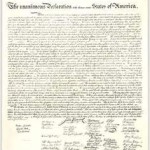 Constitution. The problem is that many people have forgotten those rights, or they have mixed up the meaning, thinking that we are not to have anything to do with religion in our government. That isn’t it at all. It says that the government is to stay out of our religious beliefs. That is not what is happening. Our current government is far too invasive in our religions.
Constitution. The problem is that many people have forgotten those rights, or they have mixed up the meaning, thinking that we are not to have anything to do with religion in our government. That isn’t it at all. It says that the government is to stay out of our religious beliefs. That is not what is happening. Our current government is far too invasive in our religions.
As time went on, England tried to usurp more and more authority over the young colonies. They tried to interfere with religion, economics, and politics. Even though we were a nation basically under them, we knew it could not continue much longer. It was decided that we needed to be independent from England. That was when we knew that we could not continue to be under this type of rule. So, why do we celebrate the 4th of July…Independence Day. We think of July 4, 1776, as a day that represents the Declaration of Independence and the birth of the United States of America as an independent nation. But it wasn’t on July 4, 1776 that the Continental Congress decided to declare independence. That was on July 2, 1776. It wasn’t the day we started the American Revolution either. That had happened back in April 1775. And it wasn’t the day Thomas Jefferson wrote the first draft of the Declaration of Independence. He did that in June 1776. It wasn’t even the date on which the Declaration was delivered to Great Britain. That didn’t happen until November 1776. It wasn’t even the date it was signed. That was August 2, 1776.
No, we celebrate the 4th of July, because that was the day that the Continental Congress approved the final 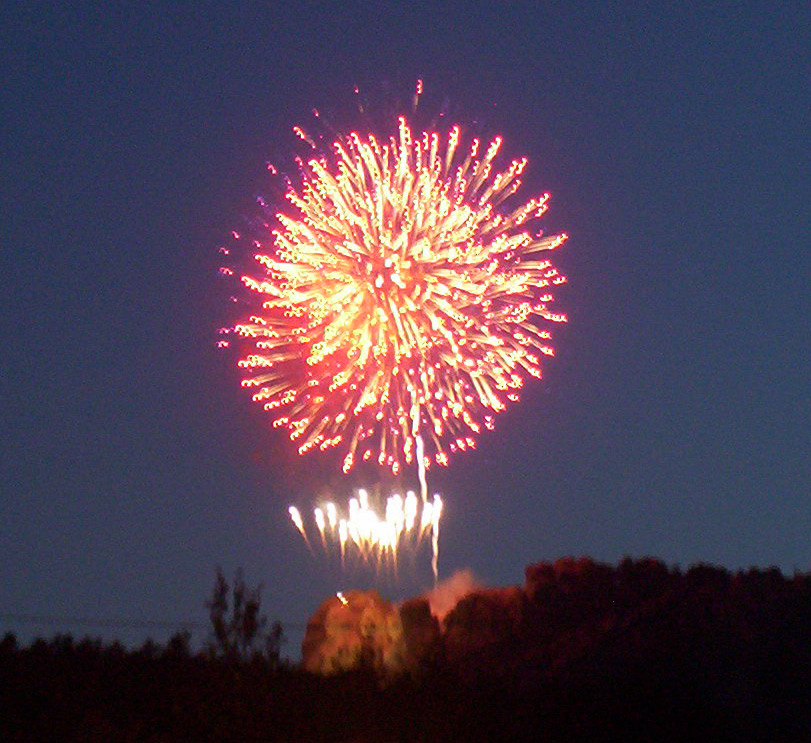 wording of the Declaration of Independence, in 1776. They’d been working on it for a couple of days after the draft was submitted on July 2nd and finally agreed on all of the edits and changes. That was the day that truly represents our Independence. Not the day it was accepted by Britain, but the day we decided to make it our own. That was the day we made freedom and independence our own. It was the day that we decided to live in peace together, with each man, woman, and child having certain rights that should never be denied them. I think some people in our country, and especially our leadership have forgotten that fact in their race to political correctness, anti-racism, and a thinly disguised attempt to control our religious rights.
wording of the Declaration of Independence, in 1776. They’d been working on it for a couple of days after the draft was submitted on July 2nd and finally agreed on all of the edits and changes. That was the day that truly represents our Independence. Not the day it was accepted by Britain, but the day we decided to make it our own. That was the day we made freedom and independence our own. It was the day that we decided to live in peace together, with each man, woman, and child having certain rights that should never be denied them. I think some people in our country, and especially our leadership have forgotten that fact in their race to political correctness, anti-racism, and a thinly disguised attempt to control our religious rights.
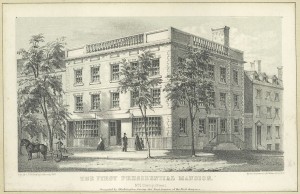
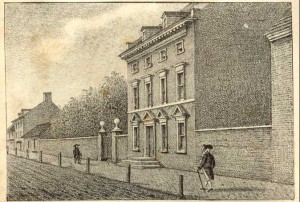 For a time it seemed that our nation couldn’t decide where to put the capitol. The first capitol…for a very short time, was New York City. President George Washington occupied two executive mansions in New York City…the Samuel Osgood House and the Alexander Macomb House. New York began building Government House, but Washington never occupied it. The capitol was moved to Philadelphia. Few people realize that it all began in New York City, nor do they realize that Philadelphia was the first official capitol of the United States. Washington DC became the capitol in December, 1800.
For a time it seemed that our nation couldn’t decide where to put the capitol. The first capitol…for a very short time, was New York City. President George Washington occupied two executive mansions in New York City…the Samuel Osgood House and the Alexander Macomb House. New York began building Government House, but Washington never occupied it. The capitol was moved to Philadelphia. Few people realize that it all began in New York City, nor do they realize that Philadelphia was the first official capitol of the United States. Washington DC became the capitol in December, 1800.
The 1790 Residence Act named Philadelphia the temporary capital for ten years untile the White House could be built on the Potomac River in what is now Washington DC. Philadelphia housed both Continental Congresses and the Constitutional Congress. Both the Declaration of Independence and the Constitution were written in Philadelphia. When it was decided that Washington DC would become the capitol, there was a bit of a fight over the move. While President Washington lived in Philadelphia, he lived in the Market Street mansion, which he altered in ways that may have influenced the White House. In an effort to keep the capitol in Philadelphia, Pennsylvania built a grand presidential mansion a few blocks from the Market Street mansion, but President Washigton declined to occupy it.
President Washington’s term would end before the White House was completed. John Quincy Adams became president and lived in the Market Street mansion from March 1797 to May 1800, having also declined to move into the grand presidential mansion that Pennsylvania had built. Then on June 3, 1800, President Adams moved to Washington DC. The White House was still not finished, so in what I found a shocking move, he moved into the Washington City Hotel, as it was properly named. It was called, and rightfully so, Tunnicliff’s, named after William Tunnicliff, who had it build, and owned it. The Washington City Hotel was in reality, a tavern. A tavern!! That is such a strange place for a US president to choose to live. I’m sure he was excited about 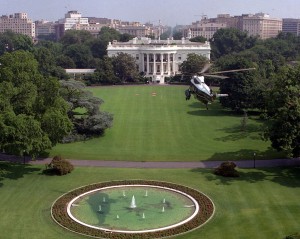
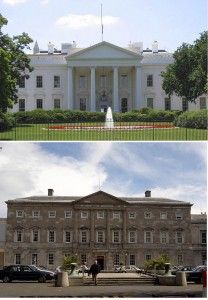 moving into the White House, but it would not be finished unto the end of October. President Adams finally moved into the White House on November 1, 1800, making him the only president to live in the Philadelphia mansion, a tavern, and the White House.
moving into the White House, but it would not be finished unto the end of October. President Adams finally moved into the White House on November 1, 1800, making him the only president to live in the Philadelphia mansion, a tavern, and the White House.
Things were much different in those days, of course. I’m sure that there was no big pre-move check of the tavern and the surrouning area, like there would be now. I suppose that there was security to some degree, but in reality most Americans wouldn’t have even known that the president had moved at that time, much less that he was living in a tavern.

